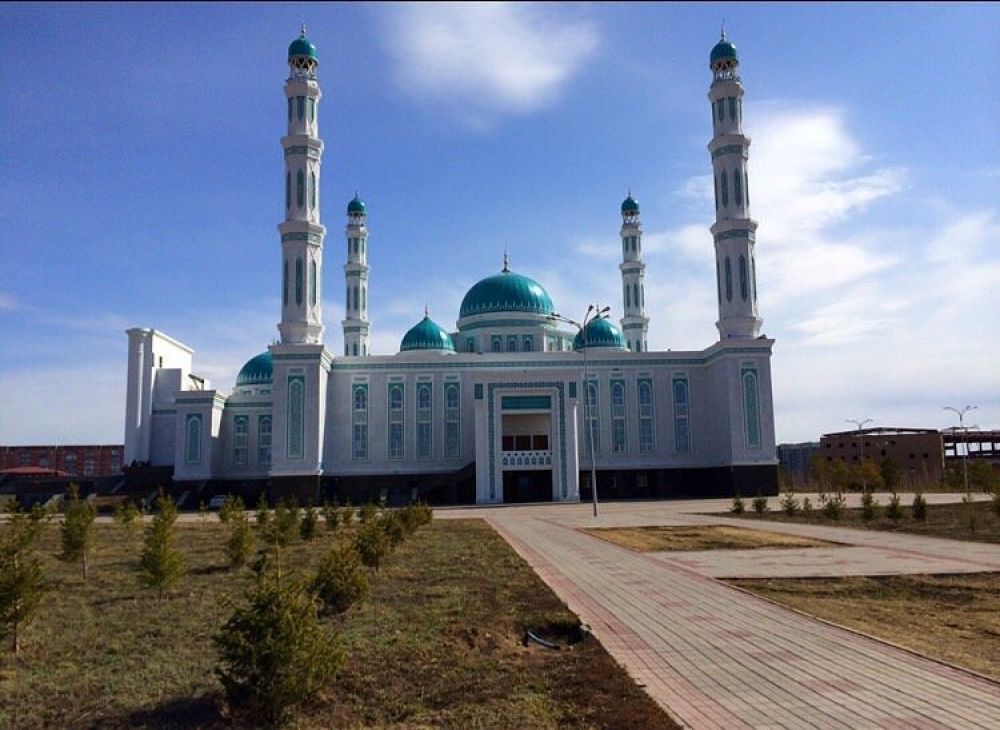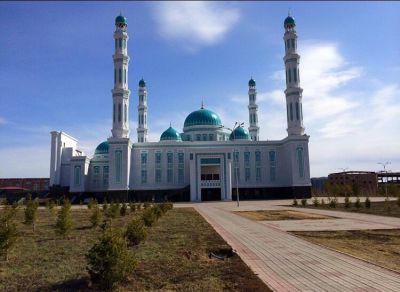

Embark on an insightful guided tour of the magnificent Regional Central Mosque of Karaganda. During this tour, you will explore the splendid architecture and intricate design that make this mosque a jewel in the region. The mosque's exterior reflects a modern interpretation of Islamic architecture with traditional Kazakh motifs. Inside, visitors can appreciate the ornate calligraphy, the grand prayer hall, and the peaceful ambiance. You’ll learn about the history of Islam in Kazakhstan, the importance of the mosque to the local community, and the various cultural practices associated with it. The tour often includes a demonstration of the call to prayer and a discussion on the symbolism of the mosque's decor. Respectful attire is required to enter, and women may be asked to wear a headscarf, which is provided on-site.
Participate in a cultural lecture at the Regional Central Mosque of Karaganda, designed to educate visitors about Islamic culture and the religious practices of Muslims in Kazakhstan. These sessions are conducted by knowledgeable speakers who provide a comprehensive overview of Islamic teachings, cultural norms, and the role of the mosque in the society. Attendees will have the opportunity to ask questions in a respectful environment, making it an enriching experience for those looking to deepen their understanding of the Islamic faith and its peaceful message. It is an ideal activity for tourists, students, and scholars interested in interfaith dialogue and cultural exchange. Remember to dress conservatively out of respect for the religious setting.
Experiencing a prayer service at the Regional Central Mosque of Karaganda is a profound way to engage with the Islamic faith. Visitors are welcome to observe one of the five daily prayers to witness the devotion and spiritual discipline of the Muslim community. The most attended prayer is the Jummah, or Friday prayer, which includes a sermon and communal prayer. Observers should remain quiet and respectful during the service and are advised to familiarize themselves with mosque etiquette beforehand. Non-Muslim visitors may be offered a separate area from where they can respectfully watch the proceedings. This activity provides a unique insight into the daily worship practices and offers a peaceful moment for reflection.
The mosque regularly holds Islamic education classes for individuals interested in learning about the Quran, Hadith, and other aspects of Islamic scholarship. These classes are open to both Muslims and non-Muslims and are often segmented by age group and level of knowledge, providing an accessible learning environment for everyone. From beginners looking to understand the basics of the faith to advanced students delving into theological discussions, the courses are designed to promote a deeper understanding of Islamic teachings. Knowledgeable instructors lead the classes, ensuring that all participants receive a comprehensive educational experience.
The mosque serves as a community hub and offers a variety of programs aimed at engaging the youth. These programs may include discussion circles, sports activities, and educational workshops that emphasize moral and spiritual development in line with Islamic values. Activities are designed to foster a sense of community and provide a supportive environment for young people to discuss issues relevant to their lives. These gatherings also serve as a platform for mentorship, allowing experienced members of the community to guide and inspire the younger generation.
Immerse yourself in the spirit of giving by participating in the charitable work organized by the Regional Central Mosque of Karaganda. The mosque often initiates food drives, clothing donations, and various community service projects. Volunteering is an excellent opportunity to give back to the community, meet local residents, and understand the mosque's role in supporting the less fortunate. In Islamic tradition, charity is highly valued, and these activities provide a practical way to put these values into action. Volunteers of all backgrounds are welcomed, and such experiences can be fulfilling and deeply impactful.
The mosque fosters a culture of understanding and inclusivity through its interfaith dialogue events. These gatherings bring people from various religious backgrounds together to discuss common values, beliefs, and traditions. Through open conversation and shared experiences, participants can learn from one another and build bridges of cooperation and friendship. Interfaith dialogues at the mosque aim to promote peace, dispel misconceptions, and encourage respectful coexistence among all community members. These events reflect the mosque's commitment to being a welcoming place for spiritual enrichment and social harmony.
Discover the beautiful art of Islamic calligraphy through workshops offered at the mosque. These sessions introduce participants to the elegant script used in Islamic art and religious manuscripts. Expert calligraphers teach the basics of penmanship and the various styles of writing, such as Kufic and Naskh. Experience the meditative process of forming Arabic letters and words while understanding their significance in Islamic culture. The workshops cater to all skill levels, from beginners to those with artistic backgrounds, and materials are typically provided. It's a creative and educational way to engage with the artistry of Islam.
Partaking in a community iftar during the holy month of Ramadan is a warm and inclusive activity offered by the mosque. Iftar is the meal with which Muslims end their daily Ramadan fast at sunset. The mosque invites Muslims and non-Muslims alike to join in breaking the fast together, fostering a spirit of community and sharing. The communal meal usually includes dates, water, and a variety of traditional Kazakh and international dishes. These gatherings are not only a way to enjoy delicious food but also a chance to learn about Ramadan's practices and the importance of fasting in Islam.
The mosque is the center of celebration for Islamic holidays such as Eid al-Fitr and Eid al-Adha. Visitors can participate in the festive atmosphere during these special occasions. The days typically begin with a communal prayer, followed by socializing, gift-giving, and feasting on traditional Kazakh and Middle Eastern cuisine. These celebrations are an excellent opportunity for non-Muslims to experience Islamic culture and hospitality firsthand. For Muslims, it's a time to come together in joy and gratitude, marking the end of Ramadan (Eid al-Fitr) or commemorating the willingness of Prophet Ibrahim to sacrifice his son in obedience to God (Eid al-Adha).
